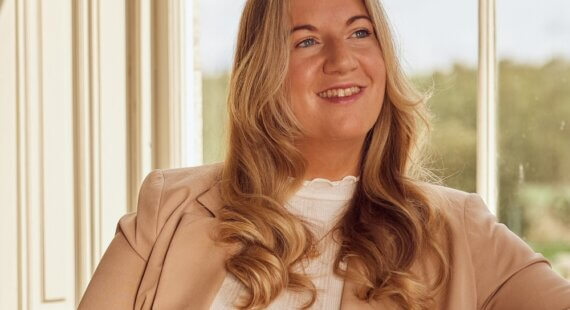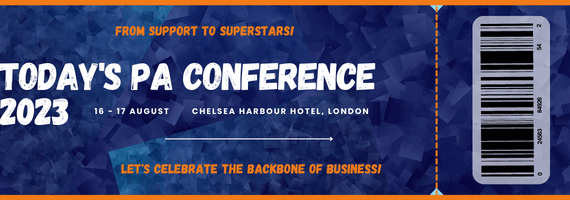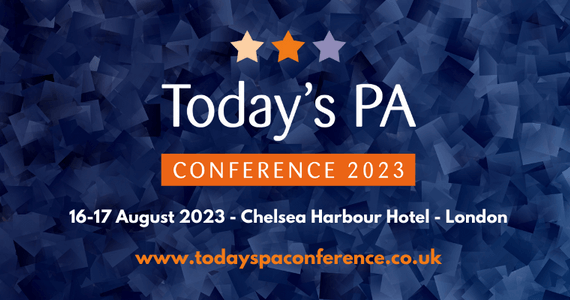Shopping cart
Your cart is empty
£0.00

Peter Flynn MVO knows what it takes to be a truly first-class Assistant. After an impressive career in the Armed Services, he became Equerry to TRH The Prince of Wales and The Duchess of Cornwall, a role that required incredibly high standards and meticulous attention to detail. Since 2013, he has been with PwC, first as Operations Director and now with the Partner Office, providing career transition support and succession planning for senior executives.
Peter will be speaking at this year’s Today’s PA Conference in August in Central London, discussing the ‘small things that make a big difference’. Drawing on his past experience, he will also be looking at the skills and attitude that make a great PA stand out from the crowd. When we spoke to him recently, we were keen to hear about his role in the Royal Household, and his advice to managers on working effectively with their PAs.
“In terms of the differences, within the Royal Household there is very much a set way of doing things, from vocabulary, spelling and format, to times and dates – every detail is set. And it doesn’t change. There is very little flexibility – everything has to be just so. But alongside that, there is also a very deep archive of knowledge. You can easily go through the archives and see how things were done 20 – 30 years ago. It doesn’t change all that much.
Some members of staff have been with the Royal Household for years or even decades, so there is a huge amount of expert knowledge and experience to lean on. In a big corporation you’d expect there to be more of a turnover of employees, but in the Royal Household that doesn’t tend to be the case.
Also, standards are exceptionally high as every single thing that goes out will be scrutinised in a particular way. I think that combination of everything having to be just so and such high standards makes it feel slightly different to a broader, more fast-paced organisation.
And that comes onto the other big difference: reputation, reputation, reputation. With everything you do in the Royal Household, you have to think about the second- and third-order questions behind a request or a piece of work. You have to think about how it could be perceived, how it could be interpreted. You have to think a lot about the rationale, the logic behind the work you’re doing, and how it might impact on the reputation of a member of the Royal Family.”
“A Royal Household has a family or a private office feel to it, although access to members of the Royal Family can be quite limited as they are so busy. In a big household they’d struggle to spend time regularly interacting with a whole staff of 70, 80, 100 people. They tend to have quite a small circle of staff that they go to and they certainly do rely heavily on their PA. However, the same core skills are required whether you’re a PA in a Royal Household, in the City, or in any small business. It’s the same challenges and people still want to get things done. I don’t think there’s any magic behind the talents and abilities of anyone who works in the Royal Household in comparison to anywhere else. It’s still the job of a PA or a secretary and it’s demanding, but then that’s the same everywhere else too.
The other similarity, which everyone can relate to, is when things go wrong or change at short notice! Being quick to react, being pro-active, all of those things are exactly the same. Yes, there are a few more bells and whistles as it’s a Royal Household. But it requires the same calibre of person: someone who can think on their feet, remain composed, and focus on the important things.”
“I was there two years. It was a brilliant two years. It started off with the wedding of the Duke and Duchess of Cambridge, then the Diamond Jubilee celebrations and the Olympics in 2012. I had pretty much all of the major state occasions during my two year tenure. I was very, very lucky.
Thinking of the most rewarding moments, I would say there are almost too numerous to mention. I was very fortunate to have close interaction with members of the Royal Family, and get an insider’s view. I learned so much, and in particular, seeing how hard they work and their sense of duty. That was fantastic.
Little things are rewarding, too. I remember once I worked up a speech and briefing note, which ran to pages and pages of work. When I sent it up, it came back with absolutely no amendments, but with a note saying “good draft”. After a year of working there, getting something like that was absolutely fantastic. It was one of the things that I was most pleased with. Although attending big state events is very rewarding, something small like that stands out.
As far as the challenges are concerned … honestly, I would say that the challenges are no different to any other role. You’re dealing with people, their requirements and their preferences, and you’re making things happen, getting things done. Genuinely, it’s no different.
In terms of change and innovation, there is probably a little bit more resistance, so that was a challenge. The Royal Household don’t really like that sort of change – but for a very good reason: continuity. What’s worked in the past will work in the future. If you do similar things again and again and again, it becomes much more efficient simply because it’s more rehearsed. And you have that knowledge and experience to fall back on.
The challenge I had was that no one really tells you what to do. It is such a unique role. I had a handover, of course, but every day is very different. You have to get over that initial nervousness, trust your instincts and your judgement, and just get on with it.”
“I’m surprised that attitude still exists, given the role is now infinitely more complex than it was even 20 or 30 years ago. If that is the perception, then organisations are missing out on a huge amount of talent and capacity.
At PwC, PAs are involved in the drive towards business goals. Event planning, client interaction, networking, presentations, coordinating matters, recruiting, budgeting, project management, extra-curricular activities. I think the requirement grows and gets more complex every decade. If PAs are doing all of these things, then that’s a million miles away from the ‘tea and typing’ of the typing pool world. And, of course, all this is not even considering the technology side of things.
Recently, just before Christmas, PwC changed from Lotus Notes to Google. Many of our PAs across the company had been on various Google courses and had become Google Champions. They then worked with the rest of us and actually enabled the whole organisation to seamlessly change from one IT operating system to another in a matter of days. That’s a huge contribution.
There is definitely a PA community feel at PwC and I like the way PAs have a foot in two camps. First there’s the PA community, with our Head of Infrastructure Services, who coordinates the activities of our PAs, including career management, grades, pay and reward. Then there is their day job, looking after partners and directors, senior managers, and working as part of team in a business. So PAs lead a dual existence, being an active member of their community and also being fully involved with the business unit and managers they’re working with. I like having this active PA network and infrastructure.”
“I think, as a matter of principle, good manners are incredibly valuable. They cost absolutely nothing. I personally value good manners and consideration more than pretty much anything else. That said, I think it’s got to be two-way.
One the maxims I use is ‘wear your master’s rank lightly’. What I mean by this is that as a PA you’re in a fairly important position because you often speak with the authority of the senior executive you’re supporting. You have to retain good manners, being firm on occasion, but polite, doing it with a little bit of sophistication, good nature and good humour. If you don’t, then you can come across as being high-handed, overly hard or dismissive, the sort of PA who is so much of a gatekeeper or guardian that they are almost intolerant of anyone approaching the boss. That behaviour reflects on the individual they’re working to. The way someone says “please” and “thank you”, the simplest of things, is a reflection of the team they’re working with and the people they’re supporting.
So, yes, it does make a difference whichever way it goes, whether it’s from the boss to the PA or the PA to the boss, and, yes, it is noticed in both directions.”
“My PA manages my emails and my calendar, and I’m pretty good at putting bits and pieces in there, too. We discuss priorities, but the way I work is I have my PA hold me to task. I tend to butterfly around and do lots of different things and speak to lots of different people. So I give my PA a lot more control. My PA can say to me, “you’ve got do this by this date, so what I need you to do is sit down and do that for an hour or two to get it cleared so you can move onto the next thing!”. I think I’ve empowered my PA to have some control over my output – because that’s what makes me work a lot better.
In order to do that, we have frequent catch-ups, not just to discuss priorities but to discuss life in general. It’s a team effort, and knowing what’s going on – whether that’s with a specific task or more generally – is really important.
My advice to anyone who wants to work more effectively with their PA is to speak openly and often. Prioritise too, because everyone knows how to work once they know the priorities. Appreciate, say thank you, have good manners at all times. Encourage your PA to learn to develop. If it’s just the ‘same old, same old’ every day, where’s the fun and interest in that? Some may be comfortable to just do a steady 9-5, do the tasks that they’ve been given. Others might be prepared to take on a project, or do some research. That helps them to develop, and, as a boss, it helps you to get the job done.
I’d say, agree what the style of working should be, how often you’re going to meet, how you’re going to track priorities, set all the ground rules in terms of access to emails, management of diary, all of those things. After that, the most important part is to have regular catch-ups, and also to have an honest conversation. Discuss what’s working well and what isn’t, rather than just letting things tick along and not being quite happy but never saying anything. What’s the point in that?”
———————
Peter will be speaking at the Today’s PA Conference on 25th August, and will also be joining our Expert PA Panel, discussing the topic ‘What Business Leaders Look for in their PAs’.



Tel.: +44 (0)20 7622 2400
Email: info@todayspa.co.uk
Today's PA
52 The Warwick Building
Chelsea Bridge Wharf
366 Queenstown Road
London
SW11 8NJ
Copyright © 2024 Today's PA. All rights Reserved.
We use cookies, just to track visits to our website, we store no personal details.
ACCEPT COOKIES What are cookies?